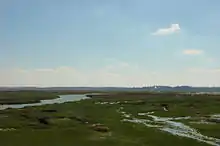Baie de Somme
Baie de Somme (Bay of the Somme or Somme Bay) is a large estuary in the Picardie région of France. The bay drains six rivers into the English Channel, principally the River Somme, and covers a total area of 72 km2 (28 sq mi). The bay is noted for its ornithological richness, as well as being a major tourist attraction.[2]
| Designations | |
|---|---|
| Designated | 23 January 1998 |
| Reference no. | 925[1] |

When the tide is out, the Baie is characterized by wide, flat areas of marsh and sand, from which the delicacy of glasswort (locally:salicornes) are collected.[3] Small ponds, dug into the marshes and filled with fake plastic ducks, are used to attract migratory birds for hunting.[4] As the tide rises the bay fills, during which time numerous working, leisure and tourist boats cross between the surrounding villages.[5]
The largest towns on the bay are Saint-Valery-sur-Somme, Le Crotoy, Cayeux-sur-Mer and, a few miles inland of the bay, Noyelles-sur-Mer. These towns are popular tourist destinations,[2][5] and are connected together by the preserved steam railway line, the Chemin de Fer de la Baie de Somme.[6] Several of the towns together form the Communauté d'agglomération de la Baie de Somme.
References
- "Baie de Somme". Ramsar Sites Information Service. Retrieved 25 April 2018.
- Barkham, Patrick. "Food, drink and wildlife in France's Baie de Somme". The Guardian. Retrieved 12 September 2016.
- "Salicorne" (in French). Cuisine a la Francaise. Retrieved 12 September 2016.
- Gartrell, Kenneth D. "A day & night at the "Hutte des 400 coups"". Gourmet Fly. Retrieved 12 September 2016.
- Brunton, John. "And then Somme". The Guardian. Retrieved 12 September 2016.
- "Chemin de Fer de la Baie de Somme". Chemin de Fer de la Baie de Somme. Retrieved 12 September 2016.
